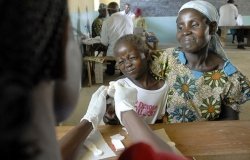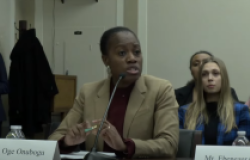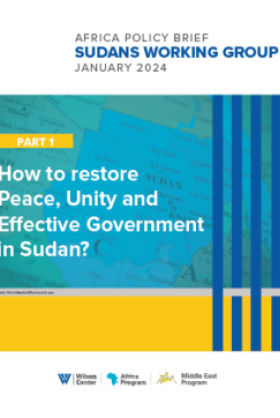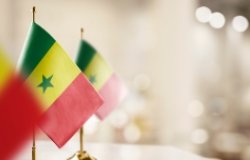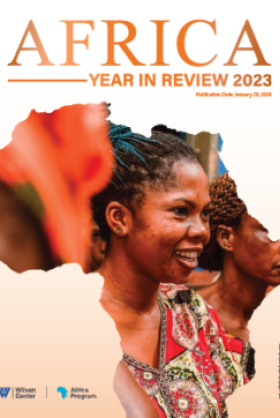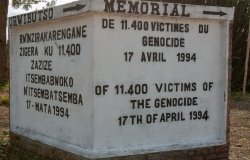An Opposition View of Uganda's Political Evolution
A discussion with Dr. Kizza Besigye, President of the Forum for Democratic Change. Besigye presented his view of Uganda's political evolution, focusing on issues of multi-party electoral democracy, and prospects for the future.Steve McDonald served as moderator.
Overview
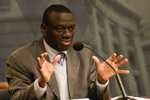 On November 27, the Wilson Center's Africa Program hosted a discussion with Dr. Kizza Besigye, President of the Forum for Democratic Change. Dr Besigye provided a profile of Uganda's political history, the status of opposition parties and the government's neo-patrimonial culture and its intolerance towards other political views. Steve McDonald moderated the discussion.
On November 27, the Wilson Center's Africa Program hosted a discussion with Dr. Kizza Besigye, President of the Forum for Democratic Change. Dr Besigye provided a profile of Uganda's political history, the status of opposition parties and the government's neo-patrimonial culture and its intolerance towards other political views. Steve McDonald moderated the discussion.
In his speech, Dr. Besigye began by saying that the "opposition" is "dispirited and various" and he does not represent them. He also stated that his views could be considered biased because of his own personal victimization by the regime. He opened his remarks by addressing the historical background of Uganda. He emphasized the pre-colonial and colonial history of Uganda suggesting that although different organized communities, the royal structures of the south, mission influenced groups, and local administrators, were brought under a central colonial administration, the colonial power failed to foster a nation-state. Uganda was and remains a "highly segmented society." These contradictions within the Uganda political scene were persistent; however, Dr. Besigye argued, they could have been easily solved by a transition to democracy. That transition was not achieved because independence brought a small ruling elite into power – "the British were replaced with Ugandans" – and this ruling elite created a small professional military, a praetorian guard, at the beck and call of the President which dominated political development.
Dr. Besigye remarked that the post independence regimes heavily relied on neo-patrimonial rule. The successive governments maintained power through patronage systems, terror and propaganda. Even the aftermath of 1980, after the Obote regime stole the elections and Museveni went to the bush to start the war that brought him to power in 1986, was yet another flexing of the neo-patrimonial muscles, this time on both sides of the political spectrum. The government's heavy reliance on the military to orchestrate political processes has destroyed internal institutions. Opposition parties, even before their banning by Museveni, were weakly organized and unable to challenge the government. Dr. Besigye argued that even when political parties were not prohibited, they served as a façade, a sop by the government to international opinion.
In 1986, as the Musevini regime assumed power, there were hopes for a transition toward democracy. However, Dr. Besigye pointed out that once in power the Musevini regime changed its tune. Political parties were repressed and neo-patrimonial rule was not only maintained, but tightened. Political parties remained banned through the constitutional referendum and first two elections held by Museveni. Only in 2004 were these parties allowed by law to operate. According to Dr. Besigye the "2001 elections were highly militarized and rigged." The 2006 elections were the first multiparty elections since 1980 but Dr. Besigye argues that the elections were flawed due to "a uninformed electorate, a partisan electoral board, military intimidation, resources used to buy votes and intimidation of the judiciary." Moreover, he remarked, although the Musevini regime has been able to improve the country's economy and decrease the impact of HIV/AIDS, the situation is reversing itself since the underlying institutions are weak, plagued by corruption and in no way capable of sustaining improvement.
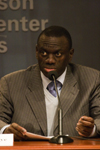 In his concluding remarks he advised that reforms had to be undertaken because the discontent among the population is "at explosive levels" and a return to violence, such as happened in 1980, is very possible. Dr. Besigye remarked that "Uganda's political evolution presents a typical case of failure to make a transition to a democracy". The prospects for this transition are quite low without essential reforms. These involve the creation of a framework for undertaking national civic education; undertaking constitutional, legal and administrative reforms; promoting the rule of law; controlling the use of public resources to minimize their use in the promotion of political patronage; promoting an independent electoral commission; protection of an independent media; stopping the partisan political use of security forces; and reinforcing civil society. Dr. Besigye emphasized that the government was not willing to undertake such reforms and that consequently there was a need for a third party intervention with the international community encouraging the process of reform and supporting the implementation of agreed reforms. Donors also should be sure that funds go to community based groups and not government. He called for the establishment of a national conference where all political and social tendencies are represented and asked for international support to encourage this development.
In his concluding remarks he advised that reforms had to be undertaken because the discontent among the population is "at explosive levels" and a return to violence, such as happened in 1980, is very possible. Dr. Besigye remarked that "Uganda's political evolution presents a typical case of failure to make a transition to a democracy". The prospects for this transition are quite low without essential reforms. These involve the creation of a framework for undertaking national civic education; undertaking constitutional, legal and administrative reforms; promoting the rule of law; controlling the use of public resources to minimize their use in the promotion of political patronage; promoting an independent electoral commission; protection of an independent media; stopping the partisan political use of security forces; and reinforcing civil society. Dr. Besigye emphasized that the government was not willing to undertake such reforms and that consequently there was a need for a third party intervention with the international community encouraging the process of reform and supporting the implementation of agreed reforms. Donors also should be sure that funds go to community based groups and not government. He called for the establishment of a national conference where all political and social tendencies are represented and asked for international support to encourage this development.
During the question and answer session, when asked about the charges pending against him, Dr. Besigye argued that there was no basis for the treason and rape charges. He is accused of organizing a rebellion in Uganda with twenty two others. Dr. Besigye went on to say that the judges for the case have argued that the witnesses were not credible and discredited their testimonies. However, because the judicial system was under pressure from the Executive, it did not throw out the case. He said that these charges are politically motivated and were done to intimidate him and his political party.
When asked about corruption, Besigye noted that defense expenditures had never gone down, even with the reduction of the armed forces from 50-30,000 soldiers. One out of every five soldiers is in the presidential guard, which also has an armored unit with tanks. Defense funds are obviously being used to underwrite the power of the presidency and are the "basis for Museveni's authority." Addressing a question about the attitudes of the World Bank and the United States toward the Museveni regime, Dr. Besigye argued that both the World Bank and the U.S. government have seen what they wanted to see, good economic growth figures and positive HIV/AIDS prevalence rates, and they need to pay more attention to the underlying structure of the regime, to the lack of checks and balances and a judiciary that is at the mercy of the executive.
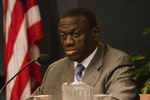 On the war in the north and the talks with the Lord's Resistance Army, Besigye criticized Museveni for tolerating the war for so many years – "the north to Kampala was like the Eastern DRC is to Kinshasa" – and the fact that the "war became a business for the army commanders." In his opinion, he felt there was great support for a solution years ago and this could have happened. With that said, however, he felt that there is hope for resolution as the war has become a big "liability" to the LRA, Southern Sudan (the third party) is pushing for a solution, Kony's resources to continue the war are declining, and the Museveni government is under pressure to bring the hostilities to a close prior to its hosting of the Commonwealth Summit in 2007. The International Criminal Court's charges against LRA leaders have complicated matters, and most Ugandans think the traditional justice system should be used for actions against the rebel leaders.
On the war in the north and the talks with the Lord's Resistance Army, Besigye criticized Museveni for tolerating the war for so many years – "the north to Kampala was like the Eastern DRC is to Kinshasa" – and the fact that the "war became a business for the army commanders." In his opinion, he felt there was great support for a solution years ago and this could have happened. With that said, however, he felt that there is hope for resolution as the war has become a big "liability" to the LRA, Southern Sudan (the third party) is pushing for a solution, Kony's resources to continue the war are declining, and the Museveni government is under pressure to bring the hostilities to a close prior to its hosting of the Commonwealth Summit in 2007. The International Criminal Court's charges against LRA leaders have complicated matters, and most Ugandans think the traditional justice system should be used for actions against the rebel leaders.
The last question pertained to the future of Uganda. Dr. Besigye noted that Uganda could take a turn for the better or the worse. He said he wasn't certain where the country was moving, but there are worrisome signs that it is going in the wrong direction.
Drafted by Mame Khady Diouf, Intern and Roseline Fodouop Tekeu, Program Assistant, Africa Program
Hosted By

Africa Program
The Africa Program works to address the most critical issues facing Africa and US-Africa relations, build mutually beneficial US-Africa relations, and enhance knowledge and understanding about Africa in the United States. The Program achieves its mission through in-depth research and analyses, public discussion, working groups, and briefings that bring together policymakers, practitioners, and subject matter experts to analyze and offer practical options for tackling key challenges in Africa and in US-Africa relations. Read more
Thank you for your interest in this event. Please send any feedback or questions to our Events staff.




